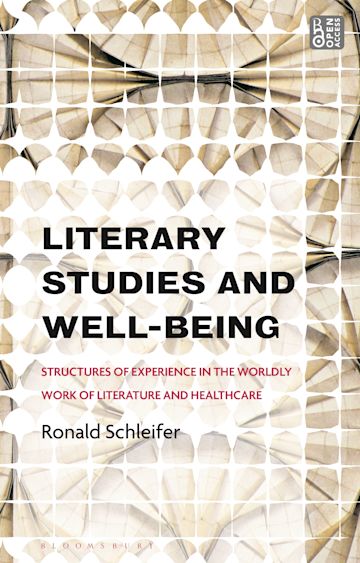In der letzten Zeit sind u.a. diese frei verfügbaren Titel erschienen:
Literary studies and well-being: structures of experience in the worldly work of literature and healthcare
Ronald Schleifer
https://doi.org/10.5040/9781350335714
The literary arts represent and provoke experiences of understanding and emotion, and this open access study examines how the practical pursuit of well-being in healthcare reveals purposes at the core of our engagements with and understanding of literature itself.
During the past twenty years, much admirable work in the “health humanities” has focused upon what studies of literature contribute to the understandings and the practical work—the “worldly work”—of healthcare. Such a project aims at developing healthcare practitioners who bring greater care to those who come to them ailing or in fear or faced with terrible suffering. Literary Studies and Well-Being turns this inside out by examining the intergenerational caretaking of healthcare in a manner which allows us to comprehend the nature and discipline of literary studies in new ways.
Frauensatiren der Frühen Neuzeit: Traditionen, Topoi, Tendenzen
Emma Louise Brucklacher
https://doi.org/10.1515/9783110779172
Herrschsüchtige Ehefrauen, wollüstige Jungfern, hässliche Vetteln, männerquälende Hexen und pseudogelehrte Frauen begegnen häufig in satirischen Schriften der Frühen Neuzeit. Indem sie misogyne Topoi und Traditionen aufgreifen und aktualisieren, erweisen sich Frauensatiren als bedeutendes transgenerisches Phänomen der deutschen Literatur- und Kulturgeschichte im Kontext der europäischen Querelle des Sexes.
Das weit über hundert Texte umfassende Corpus wird in der komparatistisch angelegten Studie erstmals erschlossen. Um die literarischen Konstruktionen ›devianter Frauen‹ systematisch zu erfassen, werden fünf strukturell dominante Genderaspekte – Herrschaft, Sexualität, Hässlichkeit/Schönheit, Diabolik und Bildung – unterschieden und in ihren jeweiligen diskursiven Strukturen und funktionalen Anlagen analysiert. Besonderes Augenmerk gilt dem intertextuellen Profil der Frauensatiren, die antike Vorbilder, mittelalterliche Traditionen und volkssprachliche Muster des frühneuzeitlichen Europa aufgreifen, translatorisch aneignen und modifizieren. Auch wenn sie meist von der Moraldidaxe bestimmt sind, entfalten Frauensatiren zunehmend eine ästhetische Eigendynamik und tendieren zum unterhaltsam-misogynen Selbstzweck.
Writing Facts: Interdisciplinary Discussions of a Key Concept in Modernity
Susanne Knaller
https://doi.org/10.14361/9783839462713
»Fact« is one of the most crucial inventions of modern times. Susanne Knaller discusses the functions of this powerful notion in the arts and the sciences, its impact on aesthetic models and systems of knowledge. The practice of writing provides an effective procedure to realize and to understand facts. This concerns preparatory procedures, formal choices, models of argumentation, and narrative patterns. By considering »writing facts« and »writing facts«, the volume shows why and how »facts« are a result of knowledge, rules, and norms as well as of description, argumentation, and narration. This approach allows new perspectives on »fact« and its impact on modernity.


